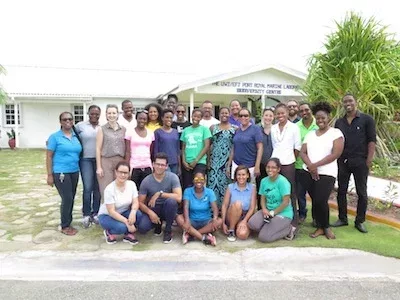The Global Coral Reef Monitoring Network (GCRMN)-Caribbean organized a regional training workshop entitled “GCRMN-Caribbean Capacity Building for Coral Reef and Human Dimensions Monitoring within the Wider Caribbean”. The workshop took place at the Port Royal Marine Laboratory, The University of West Indies, Jamaica, from 10 to 14 October 2017. The event was opened by Christopher Corbin, Programme Officer at the UN Environment Cartagena Convention Secretariat, based in Kingston, Jamaica, by Suzanne Palmer, Academic Coordinator, Port Royal Marine Laboratory, and by Marcia Creary Ford, Environmental Data Manager at the Centre for Marine Sciences, both from the University of the West Indies.
The workshop was organized within the framework of the Protocol concerning Specially Protected Areas and Wildlife (SPAW) to the Cartagena Convention with the support of the Regional Activity Centre for this Protocol (SPAW-RAC), based in Guadeloupe, and in partnership with the University of the West Indies, Mona, and the National Environment and Planning Agency (NEPA), Jamaica. Partial sponsorship was generously provided by The National Fish and Wildlife Foundation (NFWF), USA.
The aim of the Workshop was to build capacity for improving coral reef monitoring as well as regional cooperation and information sharing across the region. The training was divided into two main components reflecting – 1) the current status and future trends for coral reefs in the Caribbean; and 2) the social and economic value of coral reefs to improve their future management, and decisions on the use of coastal areas. Throughout the week, the trainers stressed the importance of the two components of the workshop, in order to achieve effective integrated monitoring of coral reefs in the Caribbean.
Fourteen participants from Jamaica (from the National Environment and Planning Agency, the Centre for Marine Sciences and the Port Royal Marine Laboratory) attended this workshop; two Cuban participants from the Cuban National Center of Protected Areas (CNAP) were also invited to join. One Cuban participant received partial funding from CERMES for participation in the workshop.
Participants in the biophysical component of the workshop were highly experienced in coral reef monitoring, and after a brief review of the GCRMN-Caribbean methodology and a reconnaissance dive, they were able to immediately conduct a complete site assessment of the Palisadoes Port Royal Protected Area (P-PRPA) reefs. The benthic, fish, invertebrate, coral recruits, and water quality data were collected from nine sites within the Port Royal Cays. These data were then sorted and compiled into excel data sheets for subsequent analysis.
The participants of the second component of the workshop were introduced to the global initiative for establishing site level socio-economic coastal and marine monitoring programmes known as Socio-economic Monitoring for Coastal Management (SocMon). SocMon is a regionally adapted, practical methodology for socio-economic monitoring for coastal management. During this training component, the Jamaican participants worked on developing a socio-economic assessment to promote the sustainable use of the natural resources in the P-PRPA by increasing public awareness about, and participation in management of the protected area. As part of a Global Environment Facility (GEF) funded project, CNAP is interested in applying the SocMon methodology to the development of sustainable economic activities for the Cocodrillo community in Isla de la Juventud, Cuba. During the week, participants developed draft socio-economic site monitoring plans for their sites of interest and also shared experience and materials from their own countries. Subsequent to the workshop, the SocMon teams will refine and finalise the draft site monitoring plans for initiation of socio-economic monitoring.
As a follow-up to the workshop, a NFWF small grant of approximately USD 3,000 allocated between biophysical and socio-economic monitoring activities based on capacity and resource needs will be awarded to the project partner in Jamaica to support analysis of biophysical data (including photo images) and a socio-economic assessment at the P-PRPA. This will result in the first complete integrated coral reef and human dimensions assessment carried out at a GCRMN-Caribbean site. These efforts are part of the GCRMN-Caribbean monitoring plan aimed at promoting sustained and standardized monitoring at regional sites for reliable assessment and reporting.
For more information on the event and GCRMN-Caribbean, please visit the SPAW-RAC website or contact: Lucie Labbouz ([email protected]), Sophie Mjati ([email protected]) and Maria Pena ([email protected]).
